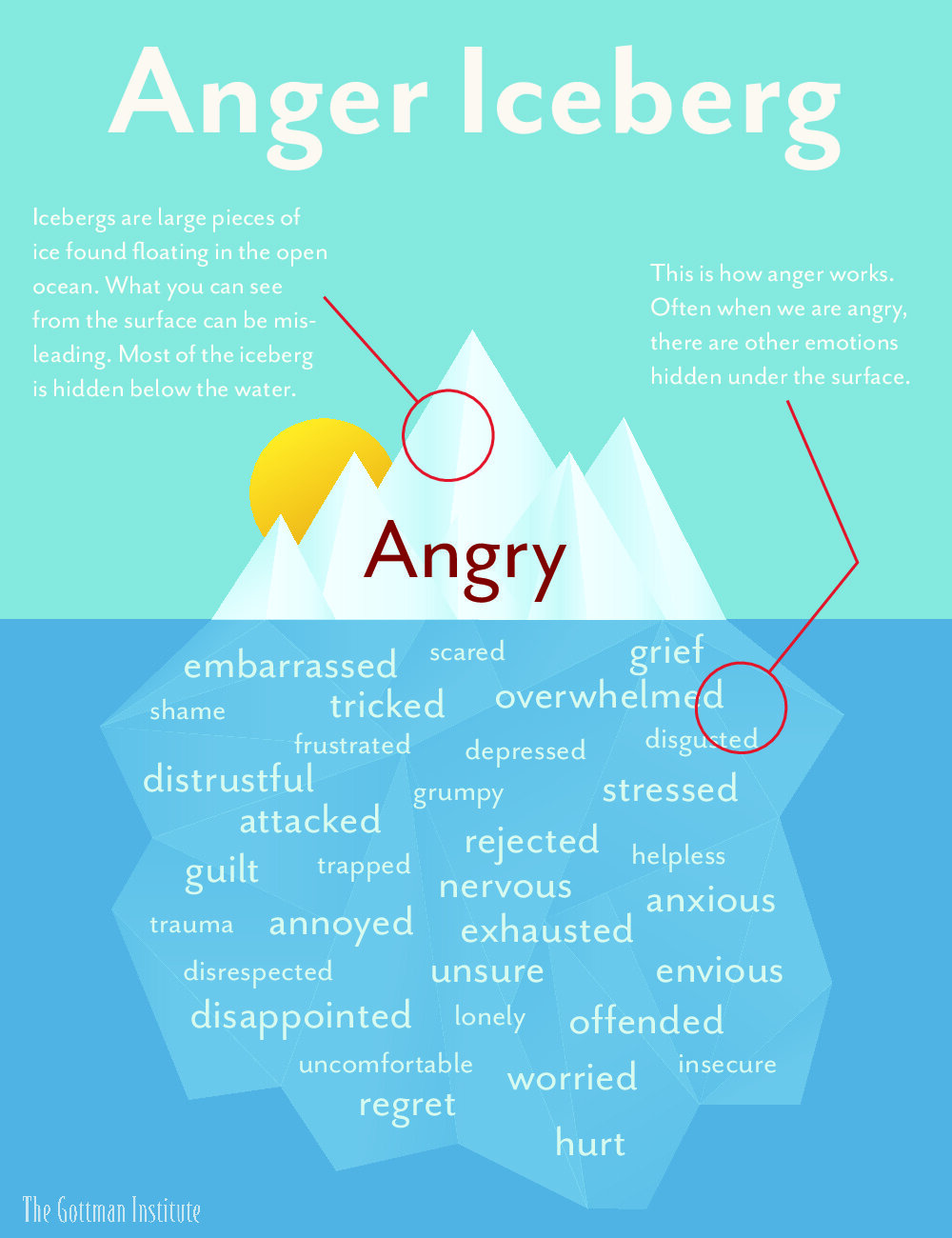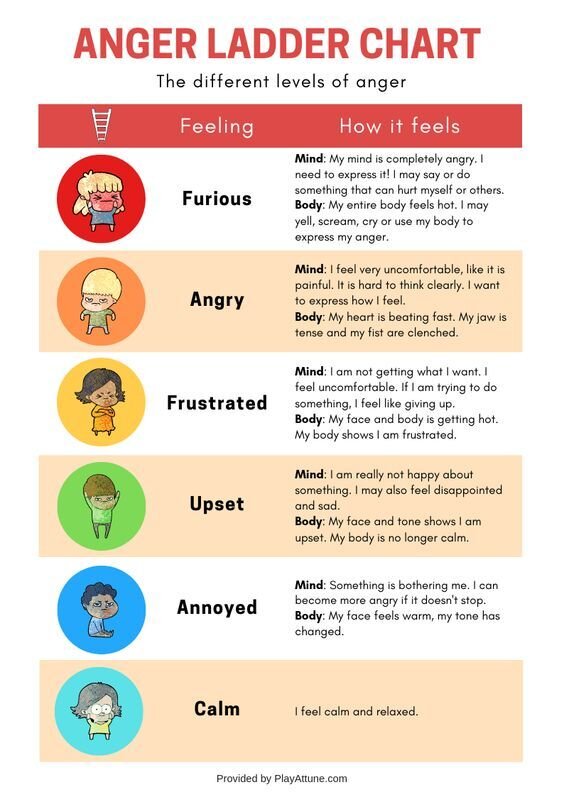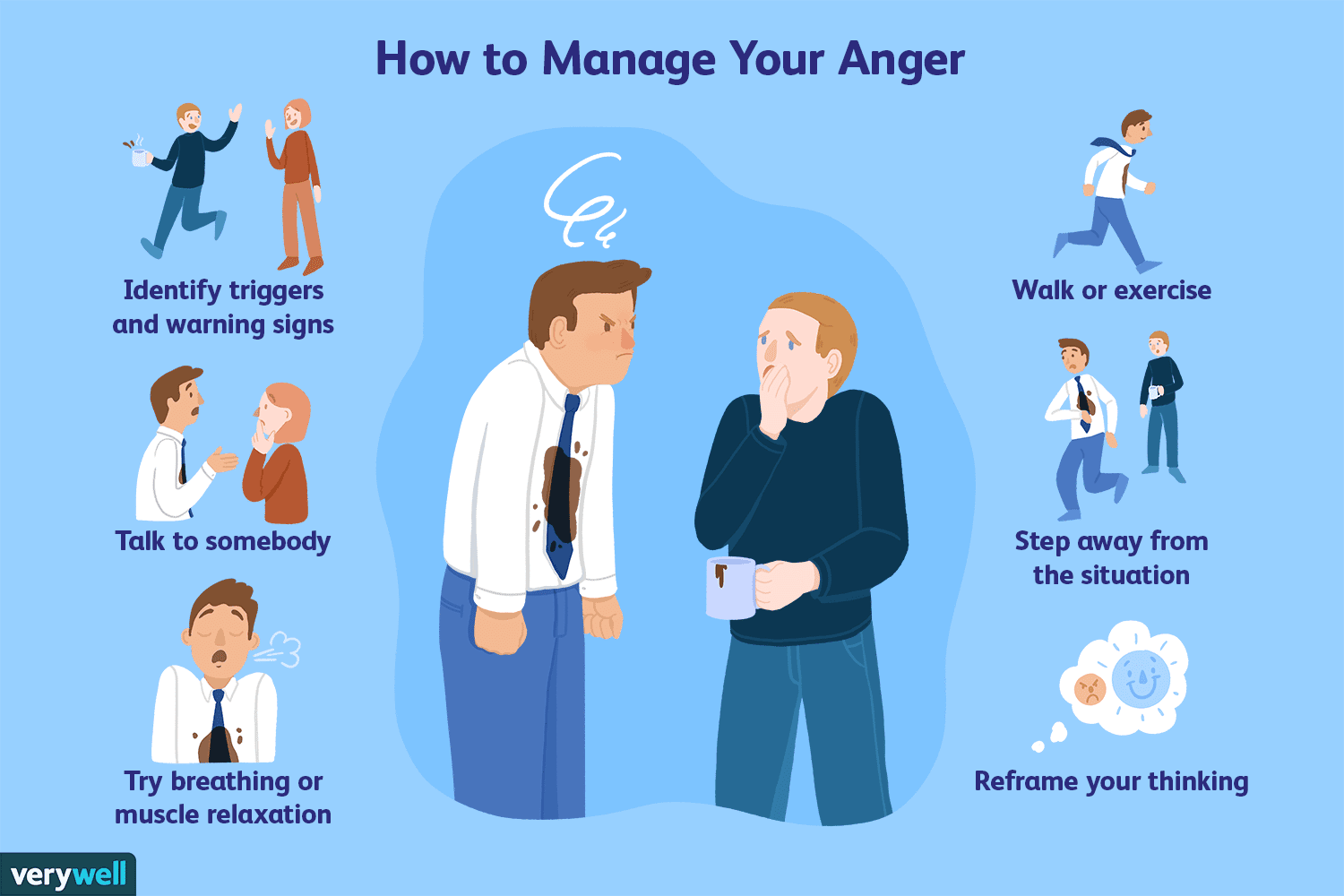Dealing With Anger
Anger is a normal, healthy emotion when it doesn’t get out of control. Anger can stem from feeling attacked, threatened, disrespected, interrupted, stressed, deceived, frustrated, powerless, unfairly treated, and more. Your reactions to these feelings, paired with your past experiences, childhood and upbringing, and current circumstances, can possibly lead you to become very angry. However, if not controlled, worked on, or managed, anger can lead to violence and unintentional harm to others. Therefore, it is important to learn how to deal with your own anger in order to avoid violent confrontations and interact in a peaceful way so you don’t harm yourself or anybody else.
How to Know if Your Anger Gets Out of Control
Anger becomes a problem when it starts to harm you or the people around you.
Signs of anger problems include when:
You find it difficult to avoid expressing anger through unhealthy, unhelpful or destructive behavior such as:
Verbal anger: aggressive shouting, swearing, threats, or name-calling
Physical anger: violence and lashing out, hitting or pushing others, breaking things, punching objects to feel a sense of release
Non-violent or passive anger: ignoring people, sulking, refusing to do tasks or doing them deliberately poorly
Inward anger: hiding your anger, harming yourself, denying yourself your basic needs, saying you hate yourself,
Your anger has a negative impact on your mental and physical health
Anger becomes your go-to emotion, blocking out other feelings
You react quickly and violently to minor issues
You wrongly accuse friends and relatives of disrespecting or lying to you
You consistently have the same arguments with people when reacting to similar triggers each time, without finding new ways to deal with these feelings of anger
You feeling frustrated with your actions during an argument or regretting them instantly after the event
You struggle to compromise or arrive easily at mutual agreements without getting angry
You have problems with expressing emotions in a calm and healthy way
Cycles of bad behaviour may be affecting relationships
Symptoms of An Anger Problem:
Depression
Anxiety
Paranoia
Frustration
Lack of sleep
Social isolation
Headaches
Increased blood pressure
Heart palpitations
Tightened or anxious feelings in the chest area
Blushing
Sweating
Fatigue
Substance abuse or addiction
Anger Management Tips
First, recognize the signs of anger:
heart is beating faster
breathing is quicker
feet are tapping
you're clenching your jaw or fists
a churning feeling in your stomach
tightness in your chest
legs go weak
tense muscles
you feel hot
you have an urge to go to the toilet
sweating, especially your palms
a pounding head
shaking or trembling
dizziness
feeling tense, nervous or unable to relax
feeling guilty
feeling resentful towards other people or situations
you are easily irritated
feeling humiliated
Then, buy yourself some time:
Count to 10 before you react. Take a few moments to collect your thoughts before saying anything you’ll regret— and allow others involved in the situation to do the same. As soon as you're thinking clearly, express your frustration in an assertive but non confrontational way.
Take a timeout. Take yourself out of the situation by going for a short walk – even if it's just around your block or local area.
Talk to a trusted person who's not connected to the situation, such as a friend, family member, counsellor or peer support group. If you don't feel comfortable talking to someone you know, you can confidentially call the Samaritans 24 hours a day to talk about anything that's upsetting you.
Techniques to Manage your Anger feelings:
Breathe slowly – try to breathe out for longer than you breathe in and focus on each breath as you take it.
Relax your body – if you can feel your body getting tense, try focusing on each part of your body in turn to tense and then relax your muscles.
Try mindfulness techniques – mindfulness can help you to be aware of when you're getting angry and can help calm your body and mind down.
Exercise – try to work off your anger through exercise. Sports like running or boxing can be really helpful for releasing pent up energy.
Use up your energy safely in other ways – this can help relieve some of your angry feelings in a way that doesn't hurt yourself or others. For example, you could try tearing up a newspaper, hitting a pillow or smashing ice cubes in a sink.
Do something to distract yourself mentally or physically – anything that completely changes your situation, thoughts or patterns can help stop your anger escalating. See our positive outlets below.
Identify possible solutions: Instead of focusing on what made you mad, work on resolving the issue at hand. Remind yourself that anger won't fix anything and might only make it worse.
Stick with 'I' statements: To avoid criticizing or placing blame — which might only increase tension — use "I" statements to describe the problem. For example, say, "I'm upset that you left the table without offering to help with the dishes" instead of "You never do any housework."
Don't hold a grudge: If you allow anger and other negative feelings to crowd out positive feelings, you might find yourself swallowed up by your own bitterness or sense of injustice. But if you can forgive someone who angered you, you might both learn from the situation and strengthen your relationship.
Use humor to release tension: Lightening up can help diffuse tension. Use humor to help you face what's making you angry and, possibly, any unrealistic expectations you have for how things should go. Avoid sarcasm, though — it can hurt feelings and make things worse.
Know when to seek help: Seek help for anger issues if your anger seems out of control, causes you to do things you regret or hurts those around you.
Anger management classes allow you to meet others coping with the same struggles and learn tips and techniques for managing your anger.
Therapy, either group or individual, can be a great way to explore the reasons behind your anger and identify triggers. Therapy can also provide a safe place to practice new skills for expressing anger.
Managing Anger in the Long Term
Explore what’s really behind your anger: is your anger masking other feelings such as embarrassment, hurt, insecurity, shame or vulnerability? Is it stemming from what you learned as a child? Is it a symptom of an underlying health problem such as depression, anxiety, trauma or chronic stress?
Identify your triggers: Look at your regular routine and try to identify activities, times of day, people, places, or situations that trigger irritable or angry feelings. When you identify your triggers, think about ways to either avoid them or view the situations differently so they don’t make your blood boil.
Negative thought processes that can trigger anger: anger doesn’t always stem directly from external factors. It is caused by how you react to and think about what happens in these instances. Here are common negative thought patterns that can trigger and fuel anger:
Overgeneralizing: For example, using phrases like “He ALWAYS interrupts me” and “NEVER is on time” or “EVERYONE disrespects me.
Obsessing over “shoulds” and “musts”: having a rigid view/structure of the way things should or must go cultivates anger when reality doesn’t line up.
Mind reading and jumping to conclusions: Assuming you “know” what someone else is thinking or feeling—that they intentionally upset you, ignored your wishes, or disrespected you.
Collecting straws: Looking for small things to get upset about, usually while overlooking or blowing past anything positive, and letting these small irritations build and build until you reach the “final straw” and explode, often over something relatively minor.
Blaming. When anything bad happens or something goes wrong, it’s always someone else’s fault. You tell yourself, “life’s not fair,” or blame others for your problems rather than taking responsibility for your own life.
Take care of yourself: taking care of your physical and mental health and wellbeing can help ease tension and diffuse anger problems
Treatment and Support: Talking Therapy and Counseling
Talk to your doctor or PCP about finding a trained professional (a counselor or psychotherapist) to talking about your problems with
Positive Outlets for Anger
Exercise
Write it out/journal
Meditate
Talk about your feelings
Medication (especially for those with ADHD, depression, anxiety, or other issues that cause frustration)
Deep breathing
Reciting a positive mantra/repeating a calming phrase such as “everything’s going to be okay”
Visualization
Putting on upbeat music and dancing
Doing something with your hands, like fixing something or making something
Doing something creative like coloring or drawing
Taking a cold shower
How to Help a Friend With Anger Problems
If your friend is dealing with anger problems, it can be very difficult, especially if they direct their anger in violent ways towards you or others. Even though it will ultimately be up to them to learn how to manage and express their anger appropriately, here are some ways you can help and support them:
Stay calm.
Try to listen to them.
Talk things through, but avoid pushing advice or opinions on them.
Validate their feelings.
Resist the urge to play along. It might seem helpful, but you don’t want to jump in with your own horror stories that may relate to what your friend is telling you. Sympathizing over how awful the world is to you too is rarely helpful.
Redirect their energy.
Give them space.
Set boundaries. Be clear in advance about what sort of behavior is and isn't acceptable to you, and think about what action you can take if someone crosses the line.
Help them identify their triggers.
Support them to seek professional help.
Look after your own wellbeing, too!
Resources
Anger Management Therapists in Hawaii: Hawaii Anger Management Therapist - Anger Management Therapist Hawaii - Anger Management Counseling Hawaii
Downloadable Worksheets
Healthy and Unhealthy Coping Strategies Worksheet: Healthy vs. Unhealthy Coping Strategies
Coping Skills: Anger Info-sheet: https://www.therapistaid.com/worksheets/coping-skills-anger.pdf
When is Anger a Problem Worksheet: When is Anger a Problem?
Triggers Worksheet: Triggers




